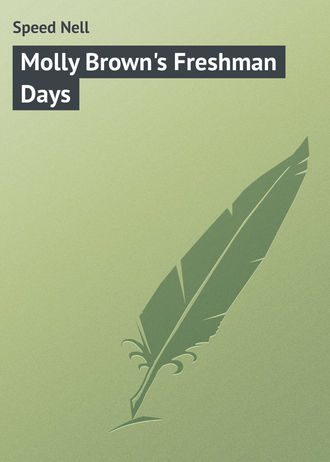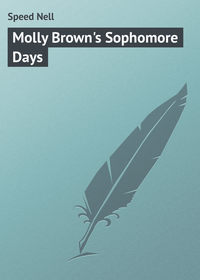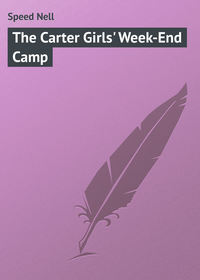 полная версия
полная версияMolly Brown's Freshman Days
Of course, she would have to give up the walk now, but it was pleasant to have been remembered and perhaps he would come again.
That night at supper Nance was unusually bright and talkative. She answered all the many questions concerning her famous mother so easily and pleasantly that even Margaret Wakefield must have been deceived.
The two sophomores at Queen’s were giving a dance that evening, and while the girls sat in the long sitting room waiting for the guests to arrive, Judy took occasion to whisper to Molly:
“Why should she have to appear at the lecture, anyhow?”
“Because it would be disrespectful not to,” answered Molly. “She must be there, of course. Would you go gallivanting off with a young man if your mother was going to give a lecture here?”
“I should say not; but that’s different.”
“No, no,” persisted Molly; “it’s never different when it’s your mother, even when she doesn’t behave like one. Can’t you see that Nance would rather die than have people know that her mother isn’t exactly like other mothers?”
The next day was one of the busiest in the week for Molly. Two of her morning hours she spent coaching Judy in Latin. Then there were her lace collars to be done up, her stockings to be darned; a trip to be made to the library, where she stood in line for more than twenty minutes waiting for a certain volume of the Encyclopædia Britannica, and spent more than an hour extracting notes on “Norse Mythology.” It was well on toward lunch time when she finally hastened across the campus to Queen’s to fill some orders for “cloud-bursts,” which were intended to be part of the refreshments for certain Saturday evening suppers.
So weary was she and so intent on getting through in what she called “schedule time,” that she almost ran into Professor Edwin Green before she even recognized him.
“Oh, I beg your pardon,” she exclaimed, a wave of color sweeping over her pale face.
“Why are you hurrying so fast on Saturday?” he asked pleasantly. “Don’t you ever give yourself a holiday?”
“Oh, yes; lots of them,” she answered; “but I’m a little rushed to-day with some extra duties.”
She thought of the “cloud-bursts,” which must be made and packed in boxes by the afternoon.
“You are overdoing it, Miss Brown. You are not obeying the doctor’s orders. When I see you there to-night I shall confront you in his presence with the charge of disobedience.”
“There to-night?” repeated Molly.
“Certainly. Have you forgotten about the supper to-night?”
“But I’m not invited.”
“Oh, yes, you are,” answered the Professor, with a knowing smile. “You’ll probably find the note waiting for you. And you must be sure and come, because the McLean’s are real characters. They will interest you, I am sure.”
“Poor Nance,” was Molly’s first thought. And her second thought was: “If her mother is invited out to dine, she can accept.” Her face brightened at this, and without knowing it, she smiled.
Molly led such a busy, concentrated life, that when she did relax for a few moments, she sometimes seemed absent-minded and inattentive. The Professor was looking at her closely.
“You are pleased at being asked to the McLean’s?” he said.
“I was thinking of something else,” she said. “I was wondering if, after all, Nance couldn’t arrange to go. Of course, she’ll be invited, too; but, you see, her mother is to be here.”
“Is Mrs. Oldham, the Suffragette, her mother?” he asked in surprise.
“Yes.”
“Mrs. Oldham is to dine at the President’s to-night. I know, because I was asked to meet her, but” – he looked at her very hard indeed – “I had another engagement.”
“Then Nance can go. Isn’t it beautiful? I am so glad!” Molly clasped her hands joyously.
Professor Green gave her such a beautiful, beaming smile that it fairly transfigured his face.
“You are a very good friend, Miss Brown,” he said gently; “but would not Miss Oldham rather be with her mother, that is, in case the President should invite her, too, which is highly probable?”
“Oh, I hope she won’t. You see, Nance has never had much pleasure with young people, and” – it was difficult to explain – “and her mother – ” she hesitated.
“Her mother, being the most famous clubwoman in America, hasn’t spent much time at home? Is that it?”
“Well, yes,” admitted Molly. “In fact, she hardly remembers she has a daughter,” she added indignantly, and then bit her lip, feeling that she was bordering on disloyalty.
The Professor cleared his throat and thrust his hands into his pockets. He was really very boyish-looking to be so old.
“So you have set your heart on Miss Oldham’s going to the supper to-night?” he said gravely.
“If there is any fun going, Judy and I would be sorry to have her miss it,” she answered. “And I don’t suppose it would be thrilling to dine at the President’s with a lot of learned older people.”
“I’m just on my way to President Walker’s now,” pursued the Professor thoughtfully. “In fact, I was just about to deliver my regrets in person regarding dinner to-night, and having some business to attend to with Miss Walker, I thought I would call. While I am there, it is possible – well, in fact, Miss Brown, there should be a good fairy provided by Providence to grant all unselfish wishes. She would not be a busy fairy by any means, I am afraid, except when she hovered around you. Good morning,” and lifting his hat, the Professor hastened away, leaving Molly in a state of half-pleased perplexity.
On the table in her room she found a note from Mrs. McLean, inviting her to supper that evening. Two other invitations from the same lady were handed to Nance and Judy, but Nance was at that moment seated at her desk accepting an invitation from Miss Walker to dine there with her mother at seven. She was writing the answer very carefully and slowly, in her best handwriting, and on her best monogram note paper.
“Do you think that’s good enough?” she demanded, handing the note to Molly to read.
“Why, yes,” answered Molly, looking it over hastily while she prepared to write her own answer to Mrs. McLean, and then she threw herself into the business of “cloud-bursts.”
Just as the lunch gong sounded, Bridget, the Irish waitress at President Walker’s house, appeared at their half-open door.
“A note for Miss Oldham,” she said; “and the President says no answer is necessary. Good afternoon, ma’am; they’ll be waitin’ lunch if I don’t make haste.”
“‘My dear Miss Oldham,’” Nance read aloud. “‘I have just learned that you are invited to a young people’s supper party to-night at Mrs. McLean’s, and I therefore hasten to release you from your engagement to dine with me. Your mother will spare you, I am sure, on this one evening, and I hope you will enjoy yourself with your friends. With kindest regards, believe me,
“‘Cordially yours,“‘EMMA K. WALKER.’”“Isn’t she a brick?” cried Judy, dancing around the room and clapping her hands.
“It was awfully nice of her,” said Nance thoughtfully. “I wonder how she knew I was invited to the McLean’s?”
“Some good fairy must have told her,” answered Molly, half to herself, as she stirred brown sugar into a saucepan.
CHAPTER XVI
THE MCLEAN SUPPER
Nance did get a telegram from her mother that afternoon. It was very vague about trains and merely said: “Arrive in Wellington about two this afternoon. Meet me. Mother.”
Fortunately, the girls were as familiar with the train schedule as with their own class schedules, and knew exactly what train she meant.
“It’s the two-fifteen, of course,” announced Judy. “Shall we go down with you to meet her, Nance?”
“Why, yes; I think mother would like that very much,” answered Nance, pleased with the idea. “She loves attention.”
Therefore, when the two-fifteen pulled into Wellington station, our three freshmen, together with Margaret Wakefield heading a deputation from the Freshman Suffrage Club, and Miss Bowles, teacher in Higher Mathematics, were waiting on the platform.
“There she is!” cried Nance, with a note of eagerness in her voice that made Molly’s heart ache.
They all moved forward to meet a gaunt, tired-looking woman, with a sallow, faded complexion and a nervous manner; but her brilliant, clear brown eyes offset her unprepossessing appearance. Glowing with intelligence and with feverish energy they flashed their message to the world, like two mariner’s lights at sea, and those who caught that burning glance forgot the tired face and distraught manner of the woman of clubs.
“How are you, my dear?” she said, kissing Nance quite casually, without noticing where the kiss was going to land, and scarcely glancing at her daughter.
She had evidently been making notes on the trip down and still carried a pencil and some scrap paper in one hand, while the other grasped her suit case, of which Nance promptly relieved her. She shook hands cordially with Miss Bowles, and the girls whom Nance introduced, searching the face of each, as a recruiting officer might examine applicants for the army. Then they all climbed into the bus and presently she plunged into a discussion with Miss Bowles on the advance of the suffrage movement in England and America.
“And this is the woman,” whispered Judy to Molly dramatically, “who has spoken before legislatures and represented the suffrage party abroad and been regent of Colonial Dames and President of National Societies for the Purification of Politics and – and lecturer on ‘The History of Legislation – ’”
“How under the sun can you remember it all?” interrupted Molly.
“I don’t think I have got them straight,” answered Judy, “but they all sound alike, anyhow, so what’s the odds?”
Molly discreetly took herself off to Judy’s room that afternoon, leaving Nance and her mother together for the short time that elapsed before the lecture was to begin. But Nance soon followed them.
“Mother wants to be alone,” she said. “She has some notes to look over, and she has never read her day-before-yesterday’s mail yet. By the way, you are not going to the lecture, are you?”
“Of course we are,” answered the girls in the same breath.
“But the walk?”
“That can be postponed until to-morrow,” answered Molly promptly. “The boys are going to spend the night at the McLean’s, you know.”
Thus Nance’s happiness was all arranged for by her two devoted friends.
The gymnasium was only half full when the girls escorted “the most distinguished clubwoman in America” across the campus and into the great hall. The freshmen had turned out in full force, partly to do honor to Nance and partly because President Margaret Wakefield had been talking up the lecture beforehand. Miss Walker and others of the faculty were there, and in a far gallery seat Molly caught a glimpse of Professor Green, whose glance seemed to be turned unseeingly in her direction.
If Judy and Molly had had any fears as to how the absent-minded member of clubs was going to conduct herself on the platform, all doubts were soon dispelled. After the introduction made by the President, the lecturer’s nervous manner entirely disappeared. She approached the front of the platform with a composure marvelous to see, and in a cultivated, trained voice – not her everyday voice, by any means – she delivered an address of fervid and passionate eloquence; a plea for woman’s rights and universal suffrage so convincing that the most obstinate “anti” would have been won over. After the lecture there was an impromptu reception on the platform; then tea at Miss Bowles’ room and at last home to dress for the supper parties.
Judy and Molly had hastened ahead, leaving Nance to tear her mother from her circle of admirers with the plea that she would be too late. At twenty minutes before seven they hurried in, Mrs. Oldham looking so frail and exhausted that it hardly seemed possible she could keep up. While her poor daughter dashed into her own clothes, her mother sat limp and inert during the process of having her hair beautifully arranged with lightning speed by the deft and handy Judy, while Molly gave the weary woman aromatic spirits of ammonia in a glass of water and presently hooked her into a dinner dress which was really very handsome, of black lace over gray satin.
“Thank you, my dears,” she said amiably, giving an absent-minded glance at herself in the glass. “You are very kind, I am sure. I am such a busy woman I have little time to spare for beautifying; but I must say Miss Kean has improved my appearance by that high arrangement of hair.”
They were surprised that she remembered Judy’s name until they learned from Nance later that such was her training in meeting strangers, she never forgot a name or face.
“Now, where am I going?” continued the famous clubwoman. “You will drop me there, you say? You are going somewhere, Nance?”
“Yes, mother,” answered Nance patiently. It was the third time she had told her mother that fact.
At last they got her be-nubiaed and be-caped, and at exactly two minutes past seven o’clock deposited her at the President’s front door.
Then, with feelings of indescribable relief, they ran gayly across the campus, chattering and laughing like magpies.
Ten minutes later they were seated at Mrs. McLean’s large round supper table.
Professor Green, seated just opposite Nance, gave her happy, glowing face a long questioning look, then turning to Molly next to him, he said:
“She is enjoying it, isn’t she?”
“Yes,” whispered Molly; “thanks to you, good fairy.”
“But the wish must come before the fairy acts, so that, after all, one is far more important than the other,” he replied.
“Wasn’t the lecture wonderful?” asked Molly.
“Very remarkable,” he answered. “Women like that should take to the platform and leave families to other women to rear.”
“They certainly can’t do both,” said Molly, remembering poor Nance’s outburst the afternoon before.
“And if you have the vote,” went on the Professor in a louder voice, and with a kind of mock solemnity, “what will you do with it?”
“They’ll pitch all the men out of office, Professor,” called Dr. McLean, who had overheard this question; “and they’ll do all the work, too, and we men will begin to enjoy life a little. We’ve been slaves long enough. I’m for the emancipation of men,” he cried, “and Woman’s Suffrage is the only way to bring it about.”
They all laughed at this original view of the question, and Mrs. McLean, a charming woman with a beautiful Scotch accent, impossible to imitate, observed:
“My dear, the women are just as great slaves as the men, and they work much harder, if only you knew it. But you don’t because we are careful to conceal it. There are vera few women who do not wear their company manners in the presence of a man, take my word for it.”
“Is that the reason you are always so charming, Mrs. McLean?” put in Professor Green. “But I suspect you have only company manners.”
“Not at all, Professor; young Andy will tell you that I can be rude enough at times.”
Andy McLean, a tall, raw-boned youth with sandy hair and a thin, intelligent face, was too deeply engaged in conversation at that moment with Nance, to hear his mother’s speech.
“Let him alone, he’s busy,” remarked his father with a humorous smile.
“There’s an old song we sing at home,” went on Mrs. McLean, “‘there’s nae luck in tha’ hoose when the gude man’s awa’,’ but it should be the gude wife, for if ever a house goes to sixes and sevens it is my own house when I leave the two Andys and take ship for Scotland for a bit of a visit. There’s nae luck in the hoose for certain, and glad they are to get me back again, if ’tis only for their own personal comfort.”
“Hoity, toity, mother,” exclaimed the doctor; “we’re joost as glad to have you for your ainsel’, my dear.”
“Now, is it so, then?” laughed the gude wife. “Well, that’s satisfying assurance, truly.”
They found the doctor and his wife very amusing, and Molly liked Lawrence Upton, too, who was seated on her other side. He was a typical college youth, tall and stalwart, his brown hair brushed back in a pompadour, his clear, ruddy complexion glowing with vigor. In fact, he was one of the leading athletes at Exmoor, and had won a championship at high jumping and running.
“I hope we’ll have some dancing after dinner, Miss Brown,” he said. “I hear Southern girls fairly float, and I’d like to have a chance to find it out.”
“I’m afraid you’ll be disappointed with me, then,” answered Molly. “I’ve been leading at most of the college dances this fall, and it’s ruination to good dancing, you know. A leader is always pulling against the bit like a badly trained horse.”
“You look to me like a thoroughbred, Miss Brown,” said the gallant youth. “I’m not afraid of your pulling against the bit.”
There was some dancing after dinner in the McLean’s long, old-fashioned drawing-room, while Mrs. McLean herself played long old-fashioned waltzes on the piano, funny hop polkas and schottisches of antique origin. They enjoyed it immensely, however, fitting barn dances to the schottisches and mazurkas and two steps to the polkas. Twice Professor Green engaged Molly in a waltz. She had anticipated that his dancing would be as old-fashioned as the music, but to her surprise, she found him thoroughly up to date. In fact, she was obliged to admit that the Professor in English Literature danced better than any of the younger men at Mrs. McLean’s that night.
It was really the most delightful evening Molly had spent since she had been at Wellington. To Nance, it was the most delightful evening of her entire life and Judy, who always enjoyed the last time best of all, told Mrs. McLean when they left that she had never had a better time in her life.
After the dance, they sat around the big open fire, roasting chestnuts, while Dr. McLean sang a funny song called “Wee Wullie,” and Judy followed with an absurd “piece” on the piano called “Birdie’s Dead,” in schottische time, which sent them into shrieks of laughter and amused Dr. McLean so that he laid his head on his wife’s shoulder and wept with joy.
Sitting in the inglenook by the fireplace, Professor Green said to Molly:
“I have been waiting to say something to you, Miss Brown, and I will ask you to regard it as confidential.”
She looked up thinking perhaps it was the comic opera he was going to talk about, but she was vastly mistaken.
“When, as Botticelli’s Flora, you came to that night with the words, ‘I saw her – ’ you did not guess, did you, that I, too, had seen her?”
They looked at each other and a flash of understanding passed between them. They now shared two secrets.
“I always wanted to tell you,” he continued in a low voice, “how much I admired your generous silence. You are a very remarkable young woman.”
With that the party broke up. Later, stretching her long slenderness in the three-quarter bed beside Judy, Molly smiled to herself, and decided that some older men were almost as nice as some young ones.
CHAPTER XVII
A MIDNIGHT ADVENTURE
Just about this time a new figure appeared at Wellington College. She was known as “inspector of dormitories,” and her office was mainly sanitary, and did not infringe on the duties of the matrons. The new inspector lodged at Queen’s, since there was an empty room in that establishment, and her name was Miss Steel.
“If she had had her choice of all the names in the English language, she could not have chosen a more suitable one,” remarked Judy who had taken a violent dislike to Miss Steel from the first.
She was indeed a steel-like person, steely eyes, steel-gray hair, pale, thin lips, and at her belt metallic chains from which jangled notebook and pencil. When she spoke, which was rarely, her voice was sharp and incisive, and cut the air like a knife. But her most objectionable quality, the girls thought, was that she never made any sound when she walked, the reason being that she had rubber heels on her shoes.
The first real encounter the girls had with Miss Steel was at a Thanksgiving Eve spread given by the combined G. F. Society, most of the members having received bountiful Thanksgiving boxes from home. Nance’s neglected and lonely father had sent her a five-pound box of candy in lieu of the usual box, which takes a woman to plan and pack, and Judy’s devoted parents, always on the fly, had shipped her a box of fruit. All the others had received regular boxes full of Thanksgiving cheer, and the feast was to be a grand one. Each member invited guests, and by general vote extra ones were asked: Frances Andrews, who declined because she was going away, and two freshmen who lived in the village, and were working their way through college. Judith Blount was to be there by invitation of pretty Jessie Lynch, and Molly had invited Mary Stewart.
Most of the girls wore fancy costumes, and Molly’s and Nance’s large room was the scene of an extravaganza. The feast was piled on four study tables placed in an unbroken row and covered with a white cloth.
Jessie had worn her famous ballet costume, and was as pretty as a little captive sprite. Judith was in a gorgeous Turkish dress consisting of full yellow silk trousers, a tunic of transparent net and embroidered Turkish slippers. Nance wore her Scotch costume, and at the last minute Molly, who had been too busy even to think of a costume all day, dressed herself up charmingly like a Tyrolean peasant in what she could collect from the other girls.
A great many of the guests had arrived and the room was filled when a chambermaid appeared in the doorway with a tray of cards.
“Some gentlemen to call, Miss,” she said, endeavoring not to smile at a Little Boy Blue and a Little Lord Fauntleroy, who were waltzing together.
There were four cards on the tray: “Mr. Edwin Green,” “Mr. George Theodore Green,” “Andrew McLean, 2d,” and “Mr. Lawrence Upton.”
“Well, of all the strange times to pay a call,” exclaimed Molly. “Will you say that we are very sorry, but we must be excused this evening,” she said to the maid.
The servant bowed and slipped away, while all the girls in the room pounced on the cards.
“Well, I never! Four beaux, and one of them a professor!” cried Jessie, showing the cards to Judith.
“Miss Brown could hardly claim Cousin Edwin as a beau,” said Judith, her black eyes snapping. “His younger brother, George, often drags him into things, and poor Cousin Edwin consents to go because George is so timid, but as for paying a social call on a freshman, even the most self-confident freshman could hardly regard a visit from him as that.”
“I don’t regard it as that,” ejaculated Molly.
She was not accustomed to sharp-tongued people, and it was really difficult for her to deal with them properly, as Judy could, and Nance, too. But she forced herself to remember that Judith was a guest in her room, and was about to partake of some of her good Kentucky fare. She turned away without saying another word, and fortunately the maid came back just then and relieved the strained situation.
“The gentlemen say they must see you, ma’am,” she said; “and if you won’t come down to them, they’ll just come upstairs.”
“What?” cried a chorus of girls.
Suddenly there was a wild scramble on the stairs; shouts of laughter, a sound of heavy boots thumping along the hall, and four tall young men burst into the room. There were shrieks from disappearing Boy Blues and Fauntleroys, who endeavored to cover their extremities with sofa cushions, the captive sprite rushed into a closet and a wild scene of disorder and pandemonium followed.
“Don’t be frightened, ladies,” said the tallest young man, who wore correct evening clothes, from his opera hat and pearl studs to his pointed patent leather pumps. His hair was light and curly, and he had a long yellow mustache, like Lord Dundreary’s.
“Ladies! ladies! why all this excitement?” called another of the quartette, dressed in full black and white checked trousers, a short tan overcoat, a red tie and a brown derby.
The third young man wore a smoking jacket and white duck trousers, and the fourth was dressed in an English golf suit and visored cap.
“Oh, you villains!” cried Jessica, popping her head out of the closet. “You have frightened us almost to death. Do you think I wouldn’t know you, Margaret Wakefield, even in that sporting suit. Come over here and show yourself!”









